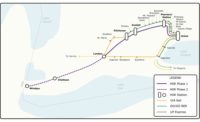The newly minted Canada Infrastructure Bank is fueling up for a fast start when it opens for business later this year, with officials in the Trudeau government already having vetted a potential first round of projects. An “interdepartmental project advisory group” met in recent weeks to discuss the rollout of the Parliament-approved, $27.5-billion bank and some initial projects the government’s new lending-investment arm might focus on, says Kate Monfette, spokeswoman for Amarjeet Sohi, federal infrastructure minister.
One project identified is Montreal’s ambitious light-rail system, which will receive a $1-billion federal commitment, Prime Minister Justin Trudeau said. The province of Quebec and Caisse de Dépôt, the giant pension fund heavily involved in financing and overseeing the $4.7-billion project known as Réseau Electrique Métropolitain, will be able to seek financing from the bank, Trudeau noted. At 76 kilometers, the Montreal line would be the world’s fourth-largest automated transit system, behind those in Vancouver, Singapore and Dubai.
Any money invested by the bank would free up already allocated federal funds for other infrastructure projects, federal officials have said. When announcing the investment, Trudeau said the Montreal line “is one of the most ambitious public transportation projects in our history.” A spokesman for CDPQ Infra Inc., the Caisse de Dépôt infrastructure unit, says it hopes to complete preliminary design in fall, with line operation set for the end of 2020.
Meanwhile, Washington Gov. Jay Inslee (D) had talks in May with Trudeau to gain bank funding for a long-gestating high-speed-rail line that would connect northwestern U.S. cities and Vancouver, British Columbia, spokespersons for the governor confirm. They said a $350,000 project feasibility study awarded to CH2M is set for release at year-end They did not provide a proposed project cost, but the line, which media have estimated at $30 billion, also is seen as a boost for a proposed technology corridor. Trains would run at speeds of at least 400 km per hour between Vancouver and Portland, Ore., with Washington stops in Bellingham, Everett, Seattle, SeaTac, Tacoma and Olympia. The state and Microsoft Corp. are funding the study. “We have heard from some Canadian counterparts that the Canada Infrastructure Bank is a possible option, and we’re open to analyzing it.” said one spokesperson.
Legislators green-lighted the bank in June, despite opposition party criticism that questioned whether the new financing arm would end up shielding investors at the expense of taxpayers if projects fail to meet financial expectations. But before the bank can start financing projects, it needs to have its executive team in place, says Jim Leech, former chief of one of Canada’s largest public pension funds who was named earlier this year as a bank special adviser. “We have to get the board and CEO hired … before any project can be brought forward for consideration,” Leech told ENR in an email, although it is not clear if he is a contender.




Post a comment to this article
Report Abusive Comment